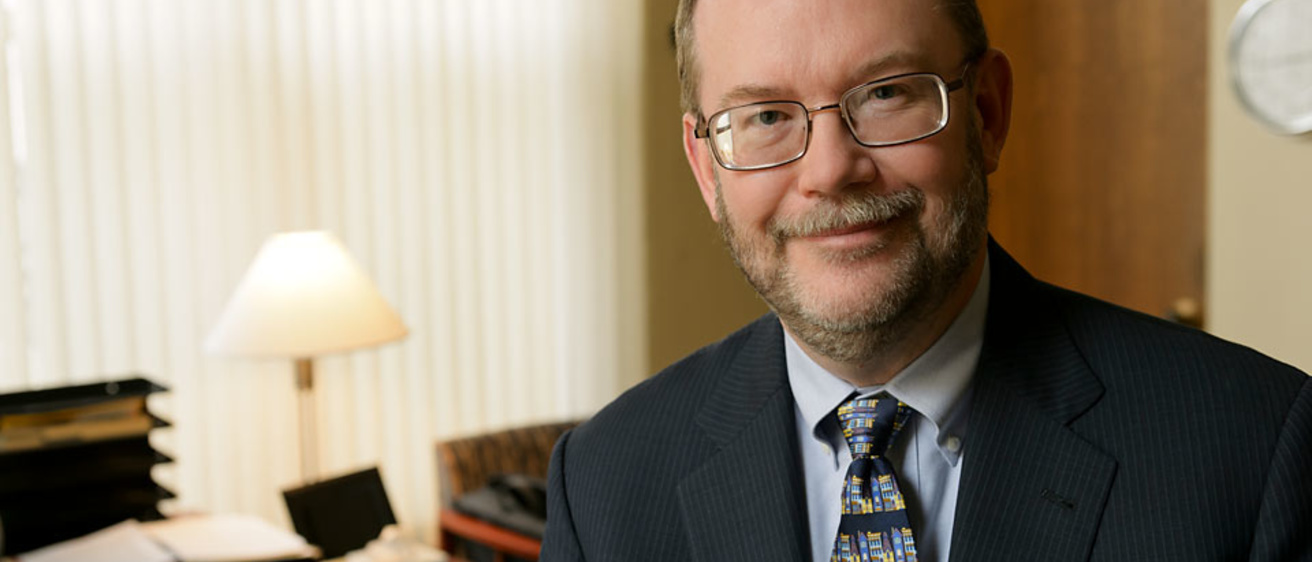Daniel Reed is less than a month on the job as the University of Iowa's new vice president for research and economic development and his expansive vision is an apt metaphor for the universe he enjoys scanning with his telescope.
A former executive at Microsoft and a longtime academic, Reed, 55, wants to accelerate the research agenda at the UI and speed the economic impact in Iowa and beyond of promising advances and findings from labs and activities campus-wide. He argues that public research universities, like the UI, must be repositories of ideas and intellectual talent, spurring the innovations that advance society and keep Iowa, and the United States, at the forefront in a rapidly changing world.
Reed sat down with Richard Lewis from Iowa Now to explain his thoughts on the position and what it will take to succeed.
What attracted you to the job?
Many things attracted me to Iowa—the state and the university. First, the University of Iowa is one of this country's great public research universities, spanning, as all great universities do, the arts and humanities, science and engineering, associated professional schools, and a world-class health care system. It is also anchored in the Big Ten, where I spent most of my academic career (Illinois) and time in graduate school (Purdue). Second, the state of Iowa is the embodiment of America’s heartland, with a rich cultural heritage and a proud history. What both share is the remarkable Iowa spirit—one of honesty, hard work, mutual respect, and quiet determination. That is a powerful combination.
Your last position was in the corporate world, as a vice president at Microsoft. How will that experience shape your view and your role as vice president for research?
As a corporate officer, I gained new perspective on the challenges and opportunities facing business in globally competitive markets. Shareholder value, time to market, opportunity cost, return on investment, competitive pressures, talent development and retention, financial risk, business processes, and product development cycles became a part of my day-to-day vocabulary and thinking in ways they never had in 25 years at the university, even though I had run large research projects and managed large academic organizations. No matter how successful the company, it is always just one economic cycle, upstart competitor, or product launch from failure. That is a sobering and focusing insight that drives every entrepreneur and businessperson.
Because I also led Microsoft’s global technology policy team, I interacted with government ministers and presidents, CEOs and other senior business leaders, heads of international agencies, nonprofit groups, think tanks, and foundations around the world. I saw firsthand how the pace of change is stressing many of our social structures and institutions. It really drove home the importance of informed discussion and debate and the critical need to communicate concepts across social, economic, cultural, and technical divides.
At the University of Iowa, I hope the combination of my academic and industry experience and insights will allow me to be a better intermediary and ambassador between academia and the business world, accelerating technology transfer and economic development.
What do you hope to accomplish?
I see my role as that of a facilitator, helping others to be successful. I have sometimes described myself as a used research salesman, carrying ideas and possibilities from group to group, and creating an environment where those ideas can flourish. I believe passionately that there are deep connections between the arts and humanities and science and technology. The passion to discover and explain is the common theme that unites all academics.
What do you think is the biggest challenge to the position?
There are really two challenges, closely connected. One is helping our faculty, staff, and students be successful and productive as researchers, both individually and in disciplinary and multidisciplinary teams. The second is ensuring that research products are translated into economic and societal benefits. The expectations and the importance of both have never been higher, as the pace of change continues to accelerate.
Please explain the value of the research enterprise in a public institution of higher education such as Iowa.
We live in a world where innovation drives economic growth. Those who fail to innovate cease to remain globally competitive economically, whether they are businesses, states, countries, or regions. In turn, innovation depends on the continued generation of new ideas by highly talented and well-trained people. Research universities combine the creation of new knowledge with the education of talented people.
To use an agricultural analogy, public research universities produce the seed corn whose growth we harvest as economic growth and prosperity. The partnership with the state and the private sector is the nourishment that allows them to grow.
You have your own telescope. Can you tell us more about that?
Astronomy has been a passion since I was a teenager. It satisfies both the scientist and technologist and the poet and philosopher in me. It is very humbling to realize that the travel time for light to reach Earth from many objects in our galaxy exceeds that of all recorded human history. There is also something serene and soul satisfying in contemplating the heavens in the quiet darkness. It clears the mind and puts many of our day-to-day struggles in perspective.
If I had not become a computer scientist, I might have become a cosmologist or astrophysicist. However, computing has sometimes allowed me to combine my hobby with my research, collaborating with research astronomers.
Currently, I have two telescopes, a 10-inch Schmidt-Cassegrain that I use for visual observing, and a 6-inch Ritchey–Chrétien with a CCD camera and digital controls that I use for astrophotography. You may have heard that it rains a bit in Seattle, my previous home. One of the many great things about moving to Iowa is the greater frequency of clear skies.
